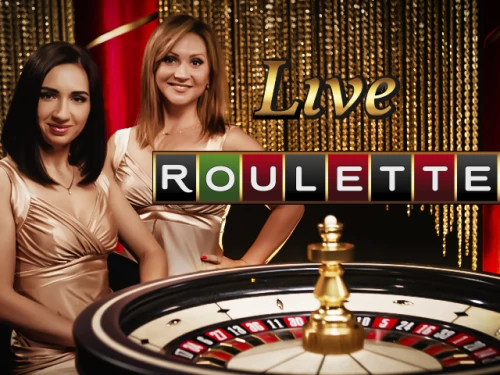Online Roulette
This article is the perfect introduction for newbie online Roulette players. In the subsequent segments, we'll take a peek at Roulette history, top online Roulette strategies to note, notable variants, and so much more!
Ready to gain context on these significant Roulette key points? Read this article to the END!


Indian gamers have access to numerous gambling categories. While some require skill, others require a steady dose of luck to make headway. If you crave an option that integrates a little bit of both, now's the time to set your sights on Roulette games.
The thrill and trepidation attached to online Roulette is out of this world. Whether you lean towards the European, American, or French online Roulette variants, the excitement attached to seeing the ball landing into your preferred (wagered) pocket is next to NONE!
Are you looking to take a detour in your gaming adventure and get started on online Roulette titles? While the journey to the top might seem a tad difficult, you can become a pro player as long as you fulfill one prerequisite — remain CONSISTENT!
The most popular roulette in India




History of Roulette: Essential Bits to Note
Numerous Indian sites are available to set sail on your favorite online Roulette alternatives. Rather than heading to land-based casinos, you can kick-start your betting endeavors on these platforms from your home's comfort.

But have you ever wondered where this game reeking of trepidation comes from or its roots? For starters, we're certain it didn't just fall out of thin air. So, we've dug deep to uncover the essential bits of Roulette history.
The roots of Roulette are under a veil of secrecy. Although many historians have sought to give an accurate timeline of its creation, their results all differ.
Nonetheless, the story or report that has caught the ears of gamblers from time immemorial depicts that Roulette was invented by a revered and accomplished maths genius named Blaise Pascal in the 17th century. This report also suggests that Roulette's inception was purely accidental as Pascal was on course to invent the Perpetual Motion Machine.
The Chinese Conspiracy
Many historians claim that the game of Roulette is based on a Chinese table game that features 37 miniature figures structured in a square that fielded 666 numbers. The game was uncovered by Dominican Monks who were an integral part of ancient China. As time rallied past, this Chinese Roulette game was adopted in select parts of Europe. Reports suggest that the format introduced in European cities had several changes.
To date, there's still no data on how the Chinese Roulette game can be played. Also, the monks changed its inner workings by replacing the square with a circle and integrating a "0" pocket.
However, there are loopholes to this story as the first French Roulette games had zeros (single and double) integrated on the table. Thus, it's no surprise that many historians consider Chinese Roulette as a faux Roulette variant.
Ancient Rome Stakes a Claim
Some reports suggest that the Roman army, besides fighting wars and conquering new territories, resorted to a Roulette format that saw them inscribe symbols into the inner areas of their shields.
After the competing soldiers had done theirs, they placed their shields down and set an arrow in the middle. Once bets were placed on the symbols present inside the featured shields, the arrow was spun and when it stopped, the symbol it pointed out ranked as the winning lot. Soldiers who bet on that specific icon won the wager.
Although these games have strong ties to Roulette, there's not enough actual evidence that validates this link.
Why France Earned the Plaudits for Roulette's Introduction
France ranks as the jurisdiction with the closest and certified ties to Roulette. First off, the concept "Roulette" is a French word. Another thing establishing this jurisdiction's links to Roulette's creation is the fact that the game adopts the inner workings of two gambling alternatives revered in Europe (the 17th century).
Tagged Roly Poly and Even-Odd, these games had spinning wheels and required players to wager on the outcome. These gambling mediums are purported to be the foundation of Blaise Pascal's Roulette iteration.
When these games were launched, they didn't attain popularity straightaway as gambling was deemed illegal in most parts of Europe. Prince Charles of Monaco's descent used the paucity of gambling-related activities to his financial advantage and curated laws that fostered Roulette wagering in this jurisdiction.
DID YOU KNOW: Ancient day Roulette traceable to France had a zero and double zero depicted on their respective tables. However, two French nationals changed the trajectory of the Roulette game by removing the table's"double zero." This action gave birth to European Roulette — a Roulette variant with a single zero and a 2.70% house edge.
American Roulette and the Rise of Online Roulette
After European Roulette had earned the buzz in numerous countries, it was soon introduced to the United States of America by European settlers. It's important to note that the initial forms of American Roulette featured 28 numbers, a single zero, a double zero, and the Eagle — the liberty symbol.
But this Roulette format underwent a makeover to incorporate the European-themed variant that had 36 (1-36). In the new format, only zeros made up the house edge.
The rise of online Roulette began in the latter stages of the 20th century (the 1990s to be precise). This timeline coincided with the rise of the Internet.
As the Internet spread to homes, people could play iterations of Roulette games via desktops for fun. Nonetheless, online Roulette wagering took flight in 1996 — when InterCasino opened its wagering doors to players.
From then onwards, the growth of online Roulette sites has been on an upward trajectory. This fact stays true to date as Indian players have access to multiple online Roulette platforms to play "Demo" games or wager for real money wins.
NOTE: To date, numerous variations of online Roulette alternatives are created by different software providers to appeal to their patrons. However, it's important to understand that these games are curated using the foundations of French, European, or American Roulette.
Online Roulette Strategies: Notable Mentions to Adopt During a Wagering Stint

Maybe you've played numerous "Demo" stints on your favorite Roulette versions. As you seek real money wins, it's not unusual to be on the lookout for strategies that'll grant you decent winning combinations.
If you're amongst this set, now's the time to use one of these notable online Roulette strategies:
Martingale
If you're new to online Roulette, the Martingale strategy is the best to employ during your wagering stints. This technique involves wagering on outside bets that pay even money — typically with 1:1 odds.
However, there's one nagging issue with the Martingale strategy. If you're on a losing stint, you can go through your casino bankroll real fast. Thus, we recommend starting your online Roulette adventure with the least bet amount and doubling it after each loss.
Once you win, start the process of placing the least wager and only doubling your bet once you've lost a round.
For example, if you placed a ₹50 wager and you lose, double it and place a ₹100 wager. When you win, revert to your ₹50 bet. It's that EASY!
Fibonacci
Fibonacci was a famous mathematician. So, you should know that an online Roulette strategy themed after his name denotes two things — maths and logical reasoning.
This strategy is solely based on the Fibonacci Sequence that appears as:
0, 1, 1, 2, 3, 5, 8, 13, 21, 34, 55, 89, 144, 233, 377, 610, 987…
Using this technique, you'd need to start with single unit wagers on even money bets. Once you make a loss, add the two previous wager amounts and place another bet. If you affect an online Roulette win, move down the sequence by two numbers and effect a wager.
Here's an example:
If you kickstart your online Roulette wagers with ₹377 and you don't win, your next bet will be 233 + 377 = ₹610. Conversely, if you win, you'd place a ₹89 wager (achieved by moving two numbers back on the Fibonacci sequence)
D'Alembert
If you're looking for an online Roulette strategy that won't eat into your casino bankroll quickly, look towards the D'Alembert technique. However, note that the pressure might get to you if you're on a losing streak.
Using the D'Alembert system, choose any wager unit and place your bets accordingly. If you lose, you increase your wager amount. On the flip side, winning means decreasing your betting value.
Here's some context:
If you start out your online Roulette stint with ₹100 and you lose the bet, your next bet should be ₹200. However, if you prompted a win with your ₹200 bet, your subsequent wager will be ₹199.
DID YOU KNOW: In the 1870s, an Englishman — Joseph Jagger — realized that certain Monte Carlo Roulette tables were unbalanced, meaning that the chances of the Roulette ball landing into certain numbers than others were higher. Although he used this to his advantage and earned a whopping 2.5 million francs in several days, online Roulette games depend on RNGs (Random Number Generators). With each spin resulting in randomized results, your best bet is employing the above online Roulette strategies.
Is It Legal to Play Online Roulette in India?
Indian gambling laws state that while skill games are legal, games of chance like Blackjack, Roulette, and Baccarat are illegal. Nonetheless, there's a loophole in this rule as it doesn't include the online casino variations of these “chance-themed titles.”
So, as long as you're wagering in your favorite online Roulette title on a site licensed by a revered gambling regulatory agency (i.e., UK Gambling Commission, Malta Gaming Authority, or Curaçao eGaming), you shouldn't have any "run-ins" with the law.
Payment Methods to Deposit for Online Roulette

If you're playing online Roulette at an Indian-themed casino site, note that you can deposit into your account via these options to place real money wagers.
Notable mentions include:
- Skrill
- PayTM
- PhonePe
- Neteller
- UPI
- Bank Transfers
- AstroPay Card
- Eazypay
- Google Pay
- ecoPayz
- MuchBetter
- Visa
- MasterCard
NOTE: Although you can facilitate instant deposits via most of the aforementioned payment alternatives, your account funding might be delayed if you use "Bank Transfers" as your choice payment medium.
Different Roulette Variants
If you'd like to commence your online Roulette adventure, getting a hold of the different Roulette versions is a MUST. Quickly, let's run through the 4 major forms of Roulette:
European Roulette
Found at many land-based casinos and online Roulette sites, European Roulette integrates 36 different numbers divided into columns of 12. At the top of the wheel is a green-themed "zero." The house edge of European Roulette is 2.70%.
American Roulette
The major difference between American Roulette and European Roulette is that the former has a double zero (00) pocket attached to it. The presence of this extra pocket decreases your winning chances. For context, the house edge on American online Roulette titles is capped at 5.25%.
French Roulette
Last but not least, French Roulette serves as the foundation of American and European Roulette. Although it features a single zero (0) pocket like European Roulette, the ball landing on this segment won't see players losing their bets.
Rather, the La Partage principle comes in — meaning that the player will receive half their wagered chips instead of losing everything. French Roulette has a house edge of 2.70%, the same as European Roulette.
Live Roulette
One of the Roulette types gaining traction at online Roulette sites is Live Roulette. Based on the inner workings of American, European, and Fresh Roulette, Live Roulette games allow you to enjoy the experience accorded to players at land-based venues with numerous HD cameras capturing the shooter at multiple angles, promoting immersive gaming.
In some Live Roulette games, players have access to statistics that capture past results. This add-on is crucial as it lets players place informed bets.
NOTE: Roulette gaming can get addictive if you don't show some restraint. If you're scared of entering the confines of Problem Gambling, utilize the Responsible Gambling add-ons available at your preferred online Roulette casino site.
Important notice for our readers:
We share objective information about online casinos but do not encourage you to gamble. Gambling involves the risk of losing money and may cause addiction.
If you still decide to play - do it responsibly: set limits, control your budget and remember it's entertainment, not an income source.
Our website is for informational purposes only - the final decision is always yours.
Frequently Asked Questions
How to Play Roulette Online?
To play online Roulette, follow these steps: - Choose an online Roulette platform - Register and verify your account - Make a deposit - Head to the game lobby and choose an online Roulette game - Tap on "Play" to get started
How to Win at Online Roulette?
To win at online Roulette, it'll be best to utilize the strategies highlighted in this article.































